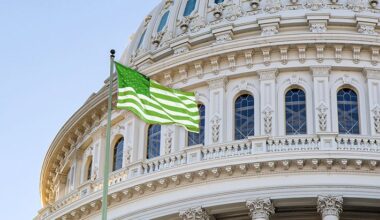
A once-significant player in Nevada’s cannabis industry is in the final stages of liquidating more than $12 million worth of assets under the guidance of a state court, offering a potential road map for marijuana businesses that are barred from seeking federal bankruptcy protection.
The legal procedure, known as a receivership, is a key option for struggling cannabis companies in Nevada and perhaps other states that can’t turn to federal bankruptcy court because marijuana remains illegal under U.S. law.
A December auction of vertically integrated operator CWNevada’s business licenses should conclude what participants believe is among the largest financial collapses of a marijuana company in the United States.
The sale generated $12.4 million, although the receiver had hoped to recover as much as twice that from the liquidation.
A variety of factors – such as an all-cash requirement to buy the licenses and market uncertainty amid the coronavirus pandemic – could have weighed on the final tally.
In the end, three retail store licenses and five cultivation and production permits were sold, pending final approval by state regulators. Regulators earlier had permanently revoked another six licenses.
Receiver appointed in 2019
In April 2019, CWNevada filed a voluntary petition for Chapter 11 bankruptcy protection amid a flurry of lawsuits from investors, edibles makers and others.
Creditors had been set to ask a Nevada judge to appoint a receiver over the company, according to the Las Vegas Review-Journal.
A court-appointed receiver took over CWNevada in June 2019 to keep the company operational until its assets could be redistributed to creditors after several of its Canopi-branded retail outlets were shuttered because of nonpayment of taxes.
Dotan Y. Melech, the court-appointed receiver who oversaw the auction, said that few marijuana companies have run into financial problems on the scale of CWNevada’s.
The Las Vegas-based company’s problems included:
- Mismanagement of inventory that resulted in penalties.
- Failure to pay state taxes.
- Failure to pay creditors, including employees.
Applying the rules of receivership to a marijuana company was new for the courts, state regulators and the industry.
“I had to be the first one, I guess,” Melech said, noting the process was “costly and complex.”
Various entities had levied more than $200 million in claims against CWNevada, and Melech had judged about $32 million of those as “allowable.”
CWNevada was facing $1.25 million in penalties for multiple failures to properly handle, test and document cannabis plants and products, including selling “off-the-books” marijuana and destroying evidence.
The penalties and another $1.5 million in state taxes forced the company to shutter its businesses, including four dispensaries, in April 2019.
The Nevada Cannabis Compliance Board (CCB) approved the proposed eventual settlement on July 22, 2020, a little more than two years after the process started.
The CCB’s predecessor, the Nevada Department of Taxation, began investigating CWNevada in 2018 after the company fell behind on tax payments, according to the settlement agreement.
Successful bidders
The auction winners, meanwhile, are undergoing state background checks, a process that usually takes at least three months.
Two companies, identified as Desert Evolution and Fortress Equities, submitted most of the approved bids for the licenses and inventory, including “FF&E” – furniture, fixtures and equipment.
According to court documents, the approved bids were:
- Desert Evolution submitted a bid of $11.9 million for Clark County licenses.
- Fortress Equities agreed to pay $385,000 for the Nye County recreational cultivation license.
- A third bidder, Consensus NV, agreed to pay $11,000 for additional inventory at a Clark County retail site.
- Desert Evolution bid $80,000 for FF&E at three sites.
- Fortress Equities bid $15,000 for FF&E at one site.
A CCB spokesperson declined to comment because “final regulatory approvals are still pending in in this matter.”
Las Vegas attorney Brian Padgett, who is the former majority owner and CEO of CWNevada, did not respond to a Marijuana Business Daily email seeking comment.
Thirty-one companies had indicated interest in bidding in the December auction.
In the end, only seven companies made initial bids for the assets in liquidation, and four participated in the auction.
Factors weigh on sale
Melech said several factors affected the sale prices of the licenses and the amount of money generated during the auction.
Receivers who might follow the same path will find themselves confronting similar issues. Among them is the “substantial risk of acquiring privilege licenses ‘as is, where is,’” with no contingencies.
In other words, successfully putting the licenses to work depends on the CCB’s approval.
Additionally, market conditions amid the pandemic remain uncertain, and some bidders were excluded because of the cash-on-hand requirements to pay for cannabis licenses in Nevada.
Melech said the sale proceeds will be sufficient to fully pay:
- What CWNevada owes Nevada for unpaid taxes, penalties and interest.
- Debt to the Nevada Labor Commissioner on behalf of 79 former CWNevada employees for unpaid wages, penalties and interest.
Investors and others with unsecured claims against CWNevada are unlikely to recover all their claims, he said.
But Melech added that litigation against a former partner of CWNevada could recover more funds for paying off additional claims.
Nevada Assemblyman Steve Yeager, who represents a district in the Southwest Las Vegas Valley, said the resolution of CWNevada’s situation provides potential guidelines for other financially strapped cannabis businesses in the state.
“It’s obviously pretty unfortunate what happened there,” Yeager said.
“I think this gives us some guidance in terms of what potentially to put into state law, to give some guidance on what to do in these situations.
“I think the Cannabis Compliance Board handled it pretty well, but we could provide guidance in the future. … There will be legislation on that.”
While Nevada considers changes to state law, Democrats in Congress are making a concerted push for federal marijuana reform.
Senate Majority Leader Chuck Schumer, a New York Democrat, has said he wants to end the federal government’s prohibition targeting marijuana and “repair the damage done to communities by the War on Drugs.”
Melech said until or unless federal legalization and bankruptcy protections are extended to the marijuana industry, receivership remains the last, best option for cannabis companies that are on the ropes financially.
Medical Disclaimer:
The information provided in these blog posts is intended for general informational and educational purposes only. It is not a substitute for professional medical advice, diagnosis, or treatment. Always seek the advice of your physician or other qualified healthcare provider with any questions you may have regarding a medical condition. The use of any information provided in these blog posts is solely at your own risk. The authors and the website do not recommend or endorse any specific products, treatments, or procedures mentioned. Reliance on any information in these blog posts is solely at your own discretion.






